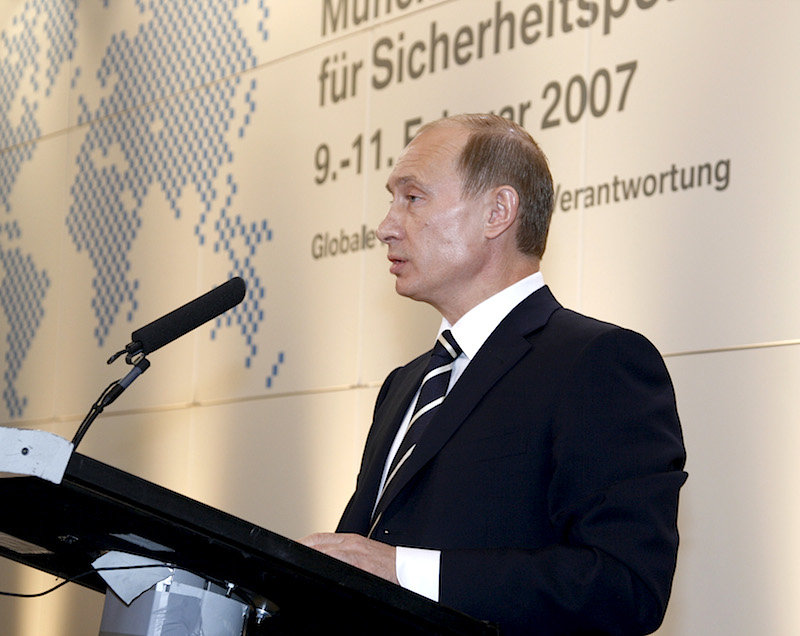"Præsident Putin er klart bevidst om de grundlæggende principper i den neo-konservative amerikanske udenrigspolitik siden 2001damental tenets of neo-conservative US foreign policy since 2001," fortalte California State University Emeritus Professor i Politisk videnskab, Beau Grosscup, forfatter og terrorisme analytiker, til Sputnik. Planen var klart lagt ud i 1992 i Pentagon Defense Planning Guidance (DPG) forfattet af Paul Wolfowitz og den senere vicepræsident Dick Cheney til at bevare USA som den eneste arkitekt i efter koldkrigstidens landskab, bemærkede Grosscup. "[Planen] omfattede forbigåelse af eksisterende internationale institutioner, især FN, for ensidig afhængighed af militær magt, og støttet af ad hoc alliancer," pointerede Grosscup.
Planen omfattede også en Full Spectrum Doktrin som sagde at USA skulle være istand til at kæmpe og vinde adskillige krige, omfattende atomkrige, for systemskifte i uvildige lande, og at det skulle forhindre fremtrædelsen af konkurrerende magter, såsom Rusland, Kina og Europa, tilføjede Grosscup.
Kommentar: Denne artikel er delvis oversat til dansk af sott.net fra: Putin's 2007 speech foresaw US drive for world domination
"Most notable is the right wing Neo-Nazi-inspired Ukrainian regime-change coup backed by the United States. Along with the Georgia political crisis in 2008, [they] are the final building blocks to move NATO to Russia's immediate borders," Grosscup claimed. The purpose of these moves was to prevent Russia's rise as a competing power and to control Central Asian oil and gas reserves, he observed.
"President Putin's concerns expressed at Munich are understandable. Putin points out correctly that the United States and its ad hoc coalition allies have used non-UN sanctioned unilateral military force in the Middle East to destabilize Iraq, Lebanon, Afghanistan, Libya, Palestinian Occupied Areas and Syria," Grosscup observed.
On the nuclear front, the United States continues its effort to "out-invent" its strategic weapons rivals with a technological breakthrough that would allow it to win a strategic nuclear war with Russia," he stated. Also, "Current US President Barack Obama had given battlefield commanders the authority to breach the conventional-nuclear threshold on their own, Grosscup warned.
However, recent Russian policies in the Middle East and Eastern Europe had blunted the drive to expand US influence, University of Louvain Professor and author of "Humanitarian Imperialism" Jean Bricmont told Sputnik. "The resistance of Russia in Syria and Ukraine has strengthened the hand of the anti-interventionists in the US," he stated.
The current US presidential election campaign had already demonstrated that the American public did not share their rulers' appetite for endless interventions and wars around the world, Bricmont emphasized. "The tide is changing, slowly but surely. The American public does not go along any more with the neo-cons-liberal interventionists," he maintained.
The pattern of voting in the early US primary and caucuses indicated that the US public had no enthusiasm for new wars, Bricmont concluded.




Kommentar: It's plain to see (and hear in this amazing video) that Putin has known all along the US game plan and has effectively parried US policy while dodging the pitfalls of US intent. His no-nonsense, heads-up, proactivity has positioned Russia, once again, in the forefront on the global stage and in the best interest of humanity, maybe its best hope as well.